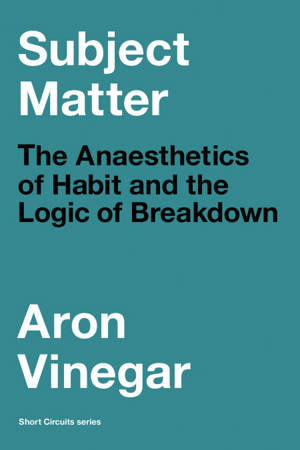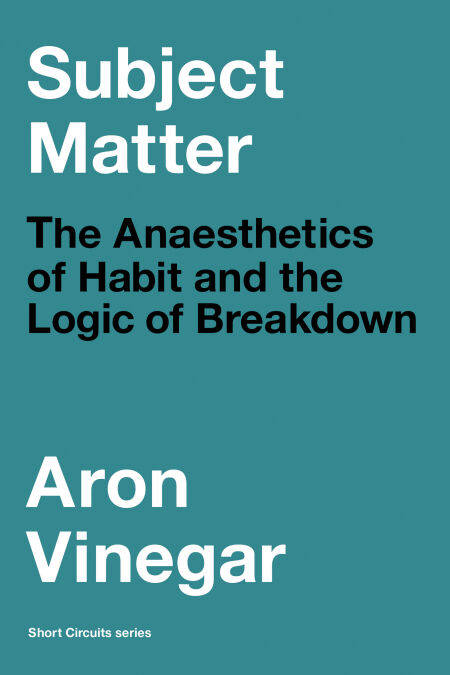
- Retrait gratuit dans votre magasin Club
- 7.000.000 titres dans notre catalogue
- Payer en toute sécurité
- Toujours un magasin près de chez vous
- Retrait gratuit dans votre magasin Club
- 7.000.0000 titres dans notre catalogue
- Payer en toute sécurité
- Toujours un magasin près de chez vous
29,52 €
+ 29 points
Description
A theorization of habit that emphasizes its excessive and unsettling qualities rather than its mediating, adaptive, and stabilizing functions.
Subject Matter offers a bold counterpoint to prevalent conceptions of habit characterized by bodily fluidity and ease, as the stabilizing foundation of an emerging subjectivity, or, more negatively, as a numbing and deadening force. Instead of facilitating the coordination of action with goal and self with environment, habit appears here as a disruptively recursive operation with extreme ontological implications that are often more quotidian than exceptional. Vinegar theorizes habit’s more perturbing aspects, from repetition compulsion to kenosis to breakdown, through an encounter between Hegel’s philosophy (of habit), psychoanalytic dimensions of repetition, Tom McCarthy’s novel Remainder, and Omer Fast’s feature-length film interpretation of the novel.
Vinegar starts with the premise that habit is an “unhappy mediator,” a disturbance of the very medium and milieu that is constitutive of the subject. Subject Matter pays close attention to those aspects of habit that are usually considered deviations from, or potential threats to, habit proper and that generate a logic of breakdown: automaticity, mechanization, thingness, inertia, and fixity. By plotting a topology of habit’s unbearability through detailed accounts of its manifestation in writing, art, aesthetics, and visuality—and through an attentiveness to the unbalanced nonrelations between mediation and immediacy, being and having, fixity and fluidity, vanishing and overflowing, abbreviation and excess, beginning and ending—Vinegar exposes habit’s failure to mediate and inhabit. In doing so, he offers new and counterintuitive insights into how habit generates the unruly grounds it is supposed to settle, thus allowing us to ask how we might break down differently.
Subject Matter offers a bold counterpoint to prevalent conceptions of habit characterized by bodily fluidity and ease, as the stabilizing foundation of an emerging subjectivity, or, more negatively, as a numbing and deadening force. Instead of facilitating the coordination of action with goal and self with environment, habit appears here as a disruptively recursive operation with extreme ontological implications that are often more quotidian than exceptional. Vinegar theorizes habit’s more perturbing aspects, from repetition compulsion to kenosis to breakdown, through an encounter between Hegel’s philosophy (of habit), psychoanalytic dimensions of repetition, Tom McCarthy’s novel Remainder, and Omer Fast’s feature-length film interpretation of the novel.
Vinegar starts with the premise that habit is an “unhappy mediator,” a disturbance of the very medium and milieu that is constitutive of the subject. Subject Matter pays close attention to those aspects of habit that are usually considered deviations from, or potential threats to, habit proper and that generate a logic of breakdown: automaticity, mechanization, thingness, inertia, and fixity. By plotting a topology of habit’s unbearability through detailed accounts of its manifestation in writing, art, aesthetics, and visuality—and through an attentiveness to the unbalanced nonrelations between mediation and immediacy, being and having, fixity and fluidity, vanishing and overflowing, abbreviation and excess, beginning and ending—Vinegar exposes habit’s failure to mediate and inhabit. In doing so, he offers new and counterintuitive insights into how habit generates the unruly grounds it is supposed to settle, thus allowing us to ask how we might break down differently.
Spécifications
Parties prenantes
- Auteur(s) :
- Editeur:
Contenu
- Nombre de pages :
- 216
- Langue:
- Anglais
- Collection :
Caractéristiques
- EAN:
- 9780262375924
- Date de parution :
- 27-11-23
- Format:
- Ebook
- Protection digitale:
- Adobe DRM
- Format numérique:
- ePub

Les avis
Nous publions uniquement les avis qui respectent les conditions requises. Consultez nos conditions pour les avis.






